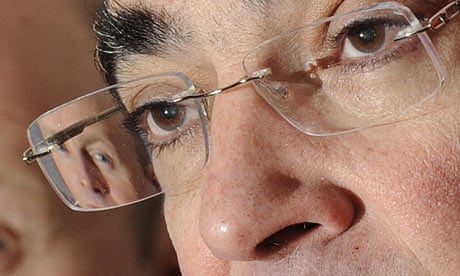The chancellor, Alistair Darling, and the business secretary, Lord Mandelson, yesterday signalled a shift in government strategy when Darling warned that Britain faces the toughest spending round in 20 years if Labour is re-elected.
Mandelson pointedly insisted that Labour is a national party that represents people in every part of the UK – an implicit rejection of any core vote strategy.
Darling also disclosed that he discussed the coming budget with Gordon Brown on Wednesday, in the middle of the backbench plot to oust him, but insisted he never considered withdrawing his support from the prime minister.
His remarks assert his authority over the schools secretary, Ed Balls, and, to a degree, the prime minister, who had tried to claim that the government could create an election dividing line based on Labour investment versus Tory cuts.
The chancellor told the Times that spending restraint was "non-negotiable" as he tries to bring down Britain's £178bn budget deficit. He said: "The next spending review will be the toughest we have had for 20 years. To me, cutting the borrowing was never negotiable. Gordon accepts that, he knows that."
Darling said he was irritated by the party coup attempt, as well as surprised. He said: "Gordon has always had my support." But he was adamant that the government needed to do more to emphasise cutting the deficit.
He said: "I have been saying for several months, as has Peter Mandelson that some departments will be facing cuts. We need to protect frontline services, but it's essential we cut the public deficit."
He added "many departments will have less money in the next few years", a tougher stance than his previous position that spending would be "broadly flat" outside the protected areas of schools, police and hospitals.
He said: "I have always been clear that you have to level with people. We are talking about something like a £57bn reduction in expenditure through tax increases and spending cuts. It's a change in direction."
He confirmed that the government will hold a budget in March, but this will not involve a full department-by-department spending review.
The Treasury believe the Conservatives are on the verge of a U-turn by agreeing with Labour that the deficit should not be cut faster than Labour's plans of halving it in four years. The shadow chief secretary to the Treasury, Philip Hammond, in a debate in the Commons on Thursday refused to say if the Tories would go faster, instead emphasising that they would start cutting the deficit earlier, beginning in the financial year 2010-11.
He warned if that did not happen, interest rates would have to rise.
Hammond insisted it was incredible for Labour to claim it could not publish departmental spending projections beyond 2010-11 in the March budget, challenging it to deny it planned to cut spending outside protected areas by 17%.
Labour insists that the fledgling economic recovery would be threatened if cuts started this year.
The Treasury chief secretary, Liam Byrne, also won a significant commitment from his Liberal Democrat counterpart, Vince Cable, that he did not think cuts should start this year. Labour believes that the Liberal Democrats on that basis would not be able to support the Tories' planned emergency summer budget, since this would involve the cuts Cable opposes.

Comments (…)
Sign in or create your Guardian account to join the discussion